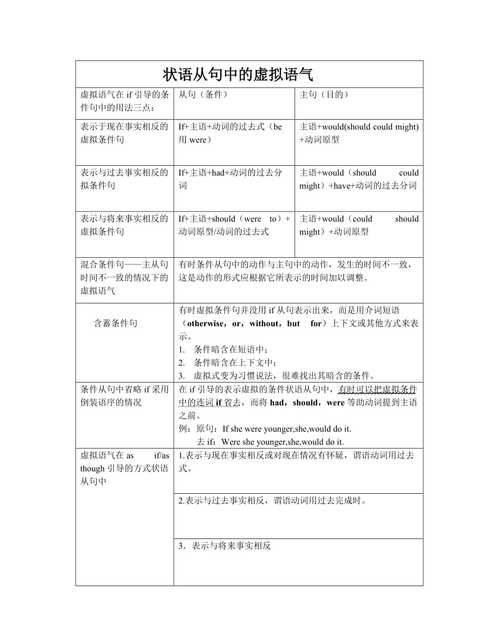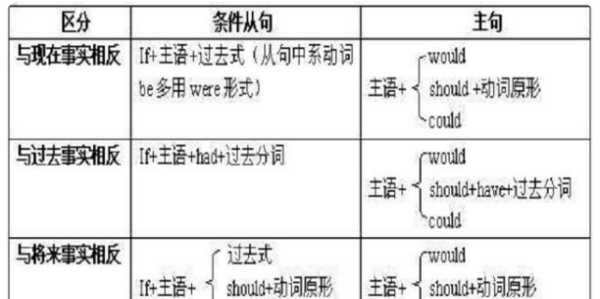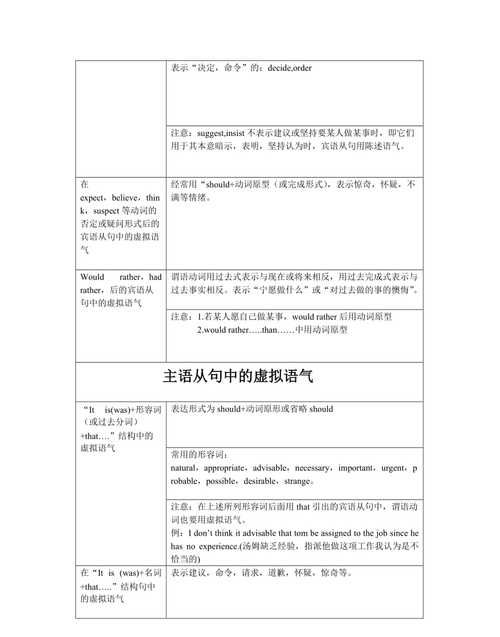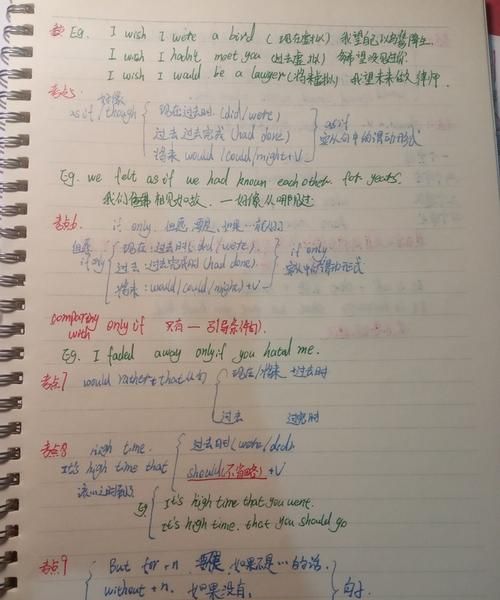本文目录
英语虚拟语气的用法归纳表
当一个人说话时欲强调其所说的话是基于自己的主观想法,愿望,假想,猜测,怀疑或建议,而不是根据客观实际,就用虚拟语气。下面,就让我把整理到的关于虚拟语气的用法的资料列出来, 以供大家参考。
虚拟语气在状语从句中的运用
虚拟语气在状语从句中的运用除了可以表示条件外,还可以表示比较、结果、目的等。虚拟语气用于表示条件的状语从句中,一般称为虚拟条件句。根据时间的不同,虚拟条件句中谓语动词时态的变化可能有三种形式,即现在、过去和将来。
If it did, it would open up its diversity program, now focused narrowly on race and gender, and look for reporters who differ broadly by outlook, values, education, and class.2001年 TEXT1
这是一个含有条件状语从句的复合句。If it did是条件状语从句。主句中主语是it;谓语动词有两个,分别是would open up...和look for...。
这是一个与现在事实相反的虚拟语气,从句用一般过去时,主句用would+动词原形open up和look for。
参考译文:如果它能注意这个问题的话,它就会拓展其雇员多样化专案,而目前的专案只单纯考虑招收不同种族和性别的员工,去雇佣那些在世界观、价值观、教育背景及社会阶层方面各不相同的记者。
虚拟语气在名词性从句中的运用虚拟语气除了用作状语从句中外,还可以用作主语从句、宾语从句、表语从句、同位语从句等名词性从中。
第一, 虚拟语气在主语从句中的运用
当it作形式主语,后面用形容词作表语,即在it is + adj.这样的句型中,当描述主语的表语形容词是advisable,critical,crucial,desirable,essential,imperative,important,incredible,inevitable,necessary,remend,strange,urgent等形容词时,主语从句的谓语动词多用虚拟语气,如果是现在时,谓语动词用should/would +动词原形should/would经常省略;如果是过去时,则用should/would + have done的形式。
It was inevitable that this primacy should have narrowed as other countries grew richer. Just as inevitably,the retreat from predominance proved painful.
这是一个含有主语从句的复合句。句首的It是形式主语,真正主语是that从句,该主语从句使用了虚拟语气should+完成时。2000年 TEXT1参考译文:随着其他国家日益富裕,美国的这一优势地位逐渐下降是不可避免的。惟其不可避免,从优势地位上退出愈发痛苦不堪。
虚拟语气在同位语从句中的运用名词advice、assumption、decision、demand、desire、insistence、order、proposal、requirement、remendation、suggestion……后面若有同位语从句,从句的谓语动词也应使用虚拟语气的形式。
Such behaviour is regarded as “all too human”,with the underlying assumption that other animals would not be capable of this finely developed sense of grievance. 2005年 TEXT1
这是个含有同位语从句的复合句。that引导的同位语从句的谓语动词由would+动词原形be构成。
参考译文:这样的行为被认为“完全是人类独有的特点”,其潜在的含义是其它动物没有这种敏锐的委屈感。
虚拟语气在表语从句中的运用与同位语从句一样,若主语是某些特定动词的同根名词参考上一部分同位语从句,要在它后面的表语从句要用虚拟式。
Another decision is whether the school should be one of the vast majority financed by the State or one of the very *** all but influential minority of private schools,though this choice is,of course,only available to the *** all number of those who can pay. 英语专业四级考试01年Text D
这是个含有表语从句的复合句。主语是another decision;谓语是is;whether……or……是表语从句,其中谓语动词由should+动词原形be构成。参考译文:另一个要做出的决定是:应该选择一所占绝大多数的国立学校呢,还是选择一所数量虽小却有影响力的私立学校呢,当然,只有少数有支付能力的人才有这种选择的权利。
虚拟语气在宾语从句中的运用表示“建议、请求、命令、要求”等主观意向的词如:suggest、advise、assume、decide、demand、desire、insist、propose、order、remend、require、suggest……,引导宾语从句时需用虚拟语气。虚拟语气中的格式很固定:谓语动词用should+动词原形,should可以省略。注意这种句型中的虚拟语气形式不受主句动词时态的影响。
Theories concerning on the individual suggest that children engage in criminal behavior because they were not sufficiently penalized for previous misdeeds or that they have learned criminal behavior through interactions with others.2004 CLOSE
此句是个含有一个宾语从句、两个原因状语从句的复合句。suggest是主句谓语,Suggest后面的宾语从句中的谓语动词engage in前面省略了should.
参考译文:关于个体研究的理论认为,孩子们从事犯罪活动是因为以前他们做错事情时对他们的惩罚力度不够,或是因为他们通过与其他人的交往学会了犯罪。
1.高考虚拟语气完成句子
2.would的用法和例句
3.语法小点——虚拟语气
4.虚拟语气“新”归纳
5.英语六级语法精析之虚拟语气

虚拟语气语法总结表格
英语虚拟语气语法总结如下:
1、虚拟语气是说话者用来表示一种假想,或者难以达到的情形,而非客观存在的事实。
2、虚式语气在条件句中的使用:条件句有真实条件句和虚拟条件句。当主句不需要虚拟语气时,真实条件句所表示的假设是可能的,而虚拟条件句则表示与事实相反或不太可能发生的假设,此时使用虚拟语气。
3、与过去事实相反,条件从句的谓语用过去完成时(had+过去分词),主句谓语用 should (would, could, might)+ have+过去分词。

使用虚拟语气的常用结构或句子:
1、 wish和 hope接宾语从句的区别在于: hope表示一般可实现的希望;宾语从句用陈述语气。wish表示难以或不可能实现的希望,宾语从句使用虚拟语气。
2、 if only同 I wish一样,用于表示与事实相反的愿望, wish后的虚拟语气与 wish后所接时态相同。
3、 I wouldrather句用虚拟语气仅分现在和过去。
当 would rather、 would sooner、 would just as soon之后的 that从句中,句子谓语习惯上要使用虚拟语气,表示"想做什么"。
英语虚拟语气总结手抄报
呵呵 希望对你有所帮助 祝楼主进步哈
1.虚拟语气
① 虚拟条件句 (if)
A:条件与现在或将来的事实不符合:if +过去时, 主+would +V原
B:条件与过去事实不符合:if +过去完成时,主+ would have done
If we had enough money, we would buy a computer.
If he knew the facts, he could tell us what to do.
If you took more exercise, you might feel healthier.
If I were to ask, would you help me?
If I had left sooner, I’d have been on time.
If I had gotten up earlier this morning, I might not have been late.
If he had received the present, he should have thanked her.
②虚拟语气在从句中的使用 : 主+(should)+V原
主+决定、打算、建议、要求、坚持+(should)+V原
urge/demand/command/order/ask/require/request/insist/intend/prefer/advise/
recommend/propose/ suggest
他们的名词之后+句子,这句子也要用同样的结构
requirement/ advice/proposal/demand/ decision/ request/ suggestion
eg: Her suggestion is that they (should) carry on their conversation in French.
it’s vital/ important/ essential/ appropriate/ strange/ advisable(明智的)/ desirable/necessary/natural… that +(should)+V原
It’s vital that we be present.
It is important that this mission not fail.
in case, lest, for fear that +(should)+V原
I put a coat over him in case that he should catch a cold.
It is a pity /a shame/no wonder that+should +V原
If only 引导的感叹句(要是。。。该多好啊)
If only I knew the answer!
If only I had seen the film yesterday!
would rather + 从句 动词用过去式或过去完成时
I would rather you told me the truth.
I would rather you had gone there last Sunday.
as if ( as though) 看起来 常用虚拟形式,即表示与现在事实相反,用过去式;与过去事实相反用过去完成式 (had done).
He speaks/ spoke as if he had known about it
He treats /treated the boy as if he were his own son.
even if ( even though)即使
Even if he were here, he could not solve the problem.
2.Wish 的用法:
Ved(现在,将来) had done(过去) would V原(有可能实现但可能性较低的愿望)
I wish we had more money.
I wish that I had never met him.
I wish you wouldn’t smoke any more
it’s (high/about) time that + V过:
It’s high time that we went to bed.
would rather(sooner)+Ved(现在、将来)/ had done(过去)
I would rather you told me the truth.
I would rather he hadn’t told me about it.
as if/though+ Ved(现在、将来)/ had done(过去)
He acts as if he knew you.
You sat there as if nothing had happened.
时态:
一般过去时:过去某一时间发生的事
主+be/V 的过去式:He was young at the time.
Betty called me this morning.
现在完成时:对现在来说已经发生的事,没有过去时间: 主+have/has +V 过去分词
The rain has stopped.
完成进行时:从过去某时起一直持续的动作,也许刚停止,也许还在进行。主+have/has been doing
I have been waiting for you for an hour.
She’s been working all morning.
一般将来时:还未发生的事。主+will do
The concert will start in a minute.
将来完成时:在将来一个时间前已经完成的动作: 主+will have done
Call us after 8o’clock. We will have finished dinner by then.
过去完成时:在过去一个时间前已经完成的动作:
主+had done
When I got to the station the train had left
一般现在时:经常性,反复性的动作,现在的状态
主+be 或V(主语为单三V+s/es)
My father is retired now. He gets up early.
现在进行时:现在正在发生的动作 主+be +Ving
Turn off the radio. Jane is studying.
被动语态:
常用时态的被动语态
过去时 主+was/were+done
A new library was completed in June.
将来时 主+will be+done
A new library will be completed next June.
现在完成时 主+have/has been+done
A new library has been completed.
一般现在时 主+am/is/are+done
Housework is always done by housewives.
现在进行时 主+am/is/are being+done
A new library is being built.
情态动词的被动语态
Can/must/should/may/have to be done
能够、必须、应该、也许会、必须被做
Should/must/may have been done本应该被做而没有、一定已经被、也许已经被
His request may be refused.
I can’t find my wallet, it must/may be stolen.
Your homework should have been finished last week.
情态动词的用法
can/must/may/should/have to do/used to do sth.
能够、必须、也许/可以、应该、不得不、曾经做
Must/can’t/may have done 推测的用法
一定已经做了、不可能已经做了、也许已经做了
He must/can’t/may have arrived already.
should/shouldn’t/needn’t have done
本应该做而没做、本不该做而做了、本不需要做而做了。
You are right, I should have thought of that.
四 情态动词+ have done
could have done 本来可以- - -
might have done 本来可能 - - -
should / ought to have done 本来应该做 - - -
shouldn’t / ought not to have done 本不该做 - -
needn’t have done 本不必做 -
would have done 本来会去做----
倒装句
否定词在居首,部分倒装,如never, little, barely, hardly, scarcely, seldom, not until, not only
at no time, under no circumstance, by no means, in no case (决不), in vain
Little did we know of this country’s abundance in natural resources.
Under no circumstances should a communist place his personal interest first.
Not only did he speak correctly, but he spoke more easily.
Hardly(scarcely)…when与No sooner…than 的句型
Hardly+ had sb done + when sb V过去时
Hardly had I got home when the telephone rang.
Only 放句首+adj/adv/介词短语
Only in this way can our honor be saved
步骤:首先快速浏览句子,先看英语不看汉语,从而判断划线处所填句子的时态,语态。
判断除了时态,语态外考察的语法(如虚拟语气)
判断考的固定搭配(不定式短语、分词短 语 ),选用合适的动词连接。

英语虚拟语气语法总结表格
虚拟语气是什么
在英语中,虚拟语气表示说话人的主观愿望、猜疑、建议或与事实不符的假设等,而不表示客观存在的事实。如:
If I were a bird,I would be able to fly in the air.
如果我是一只小鸟,我就能在空中飞行。
虚拟语气英语语法
虚拟语气是由句中的谓语动词的特殊形式表示出来的。
1、主语从句中的虚拟语气主要取决于某些形容词和过去分词,用来表示建议、命令、要求、惊异和失望等。其形式为:(should)+动词原形。
2、表语从句和同位语从句中的虚拟语气在表示建议、命令、主张、目的和愿望等名词后面的表语从句和同位语从句中谓语动词要求使用虚拟语气。其形式为:(should)+动词原形。
3、宾语从句的动词后所接宾语从句中的谓语动词要求用虚拟语气,用来表示建议、命令和要求等。其形式为:(should)+动词原形。
以上就是英语虚拟语气的语法知识点。在表示假想的虚假的、与事实相反的或难以实现的情况时用虚拟语气,表示主观愿望或某种强烈情感时,也可以用虚拟语气。

以上就是关于英语虚拟语气笔记整理,英语虚拟语气的用法归纳表的全部内容,以及英语虚拟语气笔记整理 的相关内容,希望能够帮到您。

